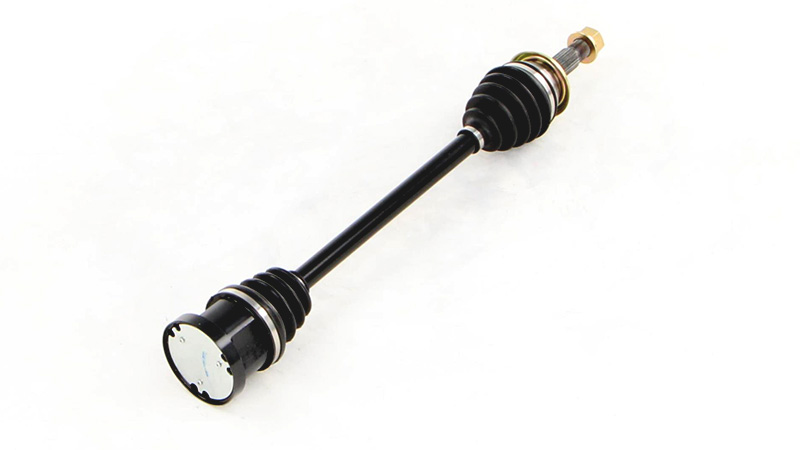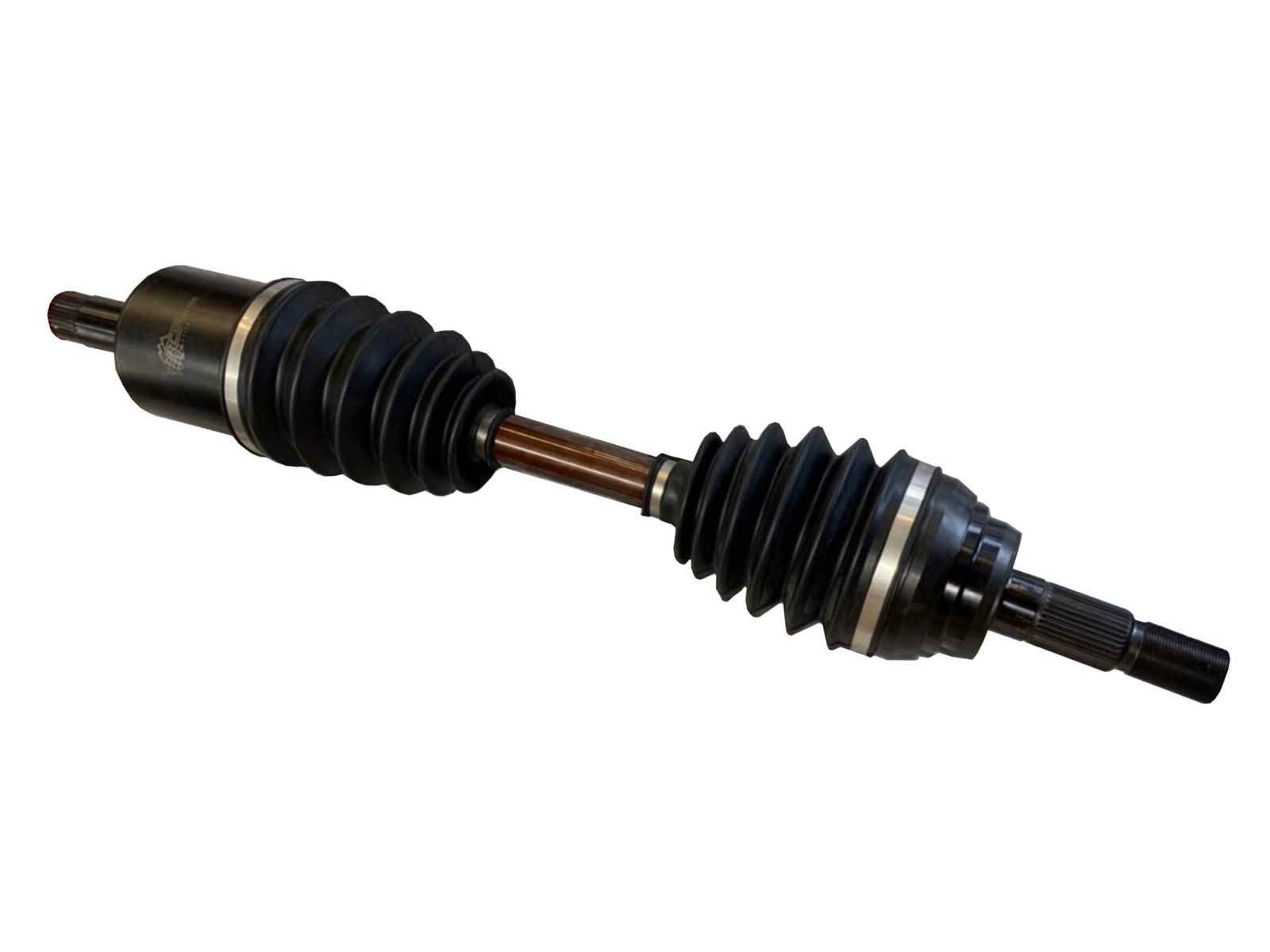Product Description
About torsion axle
Torsion axles offer a low-maintenance, reliable, quiet, smooth ride. Mastervim torsion axles make it simple to have peace of mind while trailer towing.
Torsion axles have taken the trailer industry by storm in recent years. The boom in usage can be attributed to the many benefits that torsion axles offer over standard spring axles. Their innovative design provides an array of benefits and avoids many of the shortfalls that have commonly been found in traditional spring axles.
Torsion Axle Benefits
No Maintenance
Torsion axles have a very simple design, using rubber cords and an inner bar, rather than the large array of parts found in a spring axle. The simplicity of this design means that there is little to no maintenance that needs to be done. All you have to do is lube your wheel bearings.
Smooth, Quiet Ride
Torsion axles function using a simple design that utilizes the compression of rubber cords inside the axle to cushion the trailer. This twisting and compression motion is very smooth and it rides nicely even when there is no load. Furthermore, there is no metal-to-metal contact inside the axle making it quieter and less abrasive.
Reliable
Torsion axles have fewer moving parts than traditional forms of trailer suspension. As mentioned earlier, there is no metal-to-metal contact within the axles components. This means that there are no CZPT parts rubbing against each other, causing wear or corrosion. Likewise, the rubber construction means that the axles are more corrosion resistant.
Versatility
Torsion axles can be used in an extensive range of applications, due to the ease of adjustment. To change the height of a torsion axle, the torsion bars just need to be adjusted. Additionally, half-torsion units can be used, meaning that the application does not need an axle that passes under the entire trailer. This opens up the opportunity for many custom applications and can provide benefits such as additional ground clearance.
When is it better than a Spring Axle?
They are particularly advantageous over springs axles for applications like:
- Marine/Boat trailers
- Rough/bumpy surfaces
- When much lower or higher ride height is needed
- High vibration applications (like wood chippers or generators)
- Custom applications
- Applications with limited mounting space
- Corrosive environments (like saltwater)
Torsion Axles can improve your trailer-towing experience.
Application
Camper trailer, Fifth-wheel trailer, Off-road trailer, Toy hauler trailer, Double-decker trailer, Caravan towed trailer, Solar trailer, Horse trailer, Jeep trailer, Lowboy trailer, Mobile Home, Pup up trailer, Dolly trailer, Tow dolly, Car hauler, Construction trailer, Genset trailer, Generator trailer, Snowmobile trailer, Boat trailer, Aluminum trailer, Utility trailer, Light duty trailer, etc.
Other products
Rubber Torsion Axle without brake
Rubber Torsion Axle with Electric drum brake
Rubber Torsion Axle with Mechanical drum brake
Rubber Torsion Axle with Mechanical Disc brake
Rubber Torsion Axle with Hydraulic drum brake
Rubber Torsion Axle with Hydraulic Disc brak
Related Product
Capacity Range
450kg/750kg/1000kg/1250kg/1500kg/1750kg/2000kgs/2500kg/3000kgs/3500kg/4000kg
1,650lb/1,750lb/2,500lb/3,500lb/5,200lb/6,000lb/7,000lb /8,000lb
Product Process
Cutting axle tube>welding bracket>welding torsion arm with torsion bar>surface treatment>press rubber
Why choose Mastervim?
Mastervim was established in 2004, as a manufacturer of products for trailers. The product range has varied greatly during our evolution, currently, Mastervim is focusing on developing axles, suspensions, brake parts and other components for the trailer industry.
Our customers represent all types of trailer manufacturers including marine, RV, horse, commercial/industrial, cargo, etc.
Over the past several years, Mastervim has built 5 plants in China, designed several production lines of fully customed parts, involving casting, forging, machining, welding, painting and assembling.
Mastervim is grateful to our OEM customers and suppliers for their trust and support. Please bring your suggestions for improvement to us in our efforts to make a better company. We look forward to serving you in the future.
- Instant Response: 7 x 24 hours online, reply within 3 hours
- Quick Shipping: Big 3 broker partner -MSC COSCO shipping lines, familiar with America AU EU
- OEM Advantages: Unique R&D capability/3D printer Virtua modeling/20 years experience
- Quality Control: Word famous QC system/TUV SGS DOT/Quality guarantee
/* January 22, 2571 19:08:37 */!function(){function s(e,r){var a,o={};try{e&&e.split(“,”).forEach(function(e,t){e&&(a=e.match(/(.*?):(.*)$/))&&1
| After-sales Service: | Yes |
|---|---|
| Warranty: | 24 Month |
| Type: | Axle |
| Certification: | ISO/TS16949, CCC, DOT, ISO, CE |
| Loading Weight: | 3500 Lb |
| ABS: | Without ABS |
| Samples: |
US$ 250/Piece
1 Piece(Min.Order) | |
|---|
| Customization: |
Available
| Customized Request |
|---|

Where can I find information on axle load limits for various types of vehicles?
When seeking information on axle load limits for different types of vehicles, there are several reliable sources where you can find the necessary information. Here’s a detailed explanation of where you can find information on axle load limits:
1. Vehicle Owner’s Manual:
The first and most accessible source of information on axle load limits is the vehicle owner’s manual. The owner’s manual provided by the vehicle manufacturer typically includes important details about the vehicle’s specifications, including axle load limits. Look for sections related to vehicle loading, weight distribution, or axle specifications to find the recommended load limits for each axle of your specific vehicle model.
2. Government Transportation Authorities:
Government transportation authorities, such as departments of transportation or road transport authorities, often provide guidelines and regulations regarding vehicle weight limits, including axle load limits. These authorities establish and enforce weight restrictions to ensure road safety and prevent damage to infrastructure. Visit the website of your local or national transportation authority to access relevant regulations or guidelines pertaining to axle load limits for various types of vehicles.
3. Commercial Vehicle Regulations:
If you are specifically interested in axle load limits for commercial vehicles, such as trucks or buses, consult the commercial vehicle regulations applicable in your region. These regulations are established to ensure safe and efficient operation of commercial vehicles on public roads. Regulatory bodies responsible for commercial vehicle operations often provide detailed information on axle load limits, weight distribution requirements, and other related specifications.
4. Vehicle Manufacturer or Dealer:
If you require axle load limit information for a specific vehicle model or variant, contacting the vehicle manufacturer or a local authorized dealer can be helpful. They can provide accurate and up-to-date information specific to your vehicle. Provide them with the vehicle identification number (VIN) or other relevant details to ensure they can assist you accurately.
5. Online Resources and Databases:
There are online resources and databases dedicated to providing information on vehicle specifications, including axle load limits. These resources may include vehicle data websites, forums, or government databases that compile and provide access to vehicle specifications and regulatory information. Conduct an internet search using relevant keywords to find reliable online sources that offer information on axle load limits for various types of vehicles.
When seeking information on axle load limits, it’s crucial to ensure that the information you obtain is accurate, up-to-date, and applicable to your specific vehicle and jurisdiction. Regulations and load limits can vary depending on the country, region, vehicle type, and other factors. Therefore, it is advisable to consult official sources or seek professional advice to ensure compliance with applicable regulations and ensure safe and legal operation of your vehicle.

Can you recommend axle manufacturers known for durability and reliability?
When it comes to choosing axle manufacturers known for durability and reliability, there are several reputable companies in the automotive industry. While individual experiences and preferences may vary, the following axle manufacturers have a track record of producing high-quality products:
1. Dana Holding Corporation: Dana is a well-known manufacturer of axles, drivetrain components, and sealing solutions. They supply axles to various automotive manufacturers and have a reputation for producing durable and reliable products. Dana axles are commonly found in trucks, SUVs, and off-road vehicles.
2. AAM (American Axle & Manufacturing): AAM is a leading manufacturer of driveline and drivetrain components, including axles. They supply axles to both OEMs (Original Equipment Manufacturers) and the aftermarket. AAM axles are known for their durability and are often found in trucks, SUVs, and performance vehicles.
3. GKN Automotive: GKN Automotive is a global supplier of driveline systems, including axles. They have a strong reputation for producing high-quality and reliable axles for a wide range of vehicles. GKN Automotive supplies axles to various automakers and is recognized for their technological advancements in the field.
4. Meritor: Meritor is a manufacturer of axles, brakes, and other drivetrain components for commercial vehicles. They are known for their robust and reliable axle products that cater to heavy-duty applications in the commercial trucking industry.
5. Spicer (Dana Spicer): Spicer, a division of Dana Holding Corporation, specializes in manufacturing drivetrain components, including axles. Spicer axles are widely used in off-road vehicles, trucks, and SUVs. They are known for their durability and ability to withstand demanding off-road conditions.
6. Timken: Timken is a trusted manufacturer of bearings, seals, and other mechanical power transmission products. While they are primarily known for their bearings, they also produce high-quality axle components used in various applications, including automotive axles.
It’s important to note that the availability of specific axle manufacturers may vary depending on the region and the specific vehicle make and model. Additionally, different vehicles may come equipped with axles from different manufacturers as per the OEM’s selection and sourcing decisions.
When considering axle replacements or upgrades, it is advisable to consult with automotive experts, including mechanics or dealerships familiar with your vehicle, to ensure compatibility and make informed decisions based on your specific needs and requirements.

Are there aftermarket axles available for upgrading performance in off-road vehicles?
Yes, there are aftermarket axles available for upgrading performance in off-road vehicles. Off-road enthusiasts often seek aftermarket axle options to enhance the durability, strength, and performance of their vehicles in rugged and demanding terrains. Here’s some information about aftermarket axles for off-road applications:
1. Upgraded Axle Materials:
Aftermarket axles are typically made from high-strength materials such as chromoly steel or forged alloys. These materials offer superior strength and durability compared to stock axles, making them better suited for off-road use where extreme loads, impacts, and torsional forces are encountered.
2. Increased Axle Shaft Diameter:
Some aftermarket axles feature larger diameter shafts compared to stock axles. This increased diameter helps improve the axle’s load-carrying capacity and resistance to bending or torsion. It can also enhance the overall durability and reliability of the axle in off-road conditions.
3. Upgraded Axle Splines:
Axles with upgraded splines are designed to handle higher torque loads. Aftermarket axles may feature larger and stronger splines, providing increased power transfer capabilities and reducing the risk of spline failure, which can occur in extreme off-road situations.
4. Locking Differentials:
Some aftermarket axle options include integrated locking differentials. Locking differentials improve off-road traction by mechanically locking both wheels on an axle together, ensuring that power is distributed evenly to both wheels. This feature can be advantageous in challenging off-road conditions where maximum traction is required.
5. Lifted Vehicle Compatibility:
Aftermarket axles are often designed to accommodate lifted vehicles. Lift kits that raise the suspension height can impact the axle’s operating angles. Aftermarket axles may offer increased articulation or modified geometry to maintain proper alignment and reduce the risk of binding or premature wear.
When considering aftermarket axles for off-road vehicles, it’s essential to choose options that are compatible with your specific vehicle make, model, and suspension setup. Working with reputable manufacturers, consulting with experienced off-road enthusiasts, or seeking advice from professional mechanics can help you select the most suitable aftermarket axle upgrades for your off-road needs.
Lastly, it’s important to keep in mind that upgrading axles alone may not be sufficient for maximizing off-road performance. Other components such as suspension, tires, differential gears, and drivetrain systems should be considered as part of a comprehensive off-road build to ensure optimal performance, reliability, and safety.


editor by CX 2024-05-09